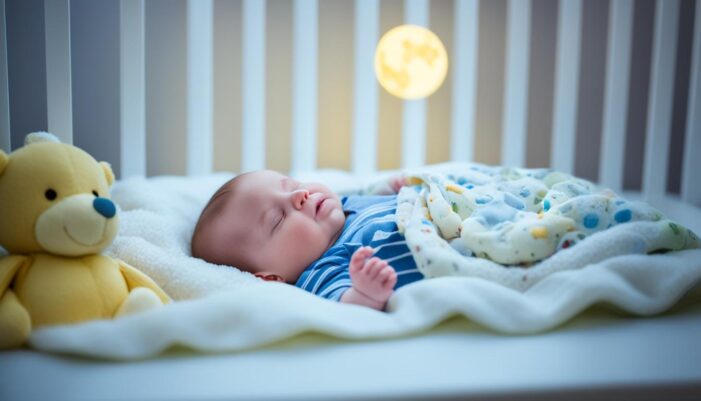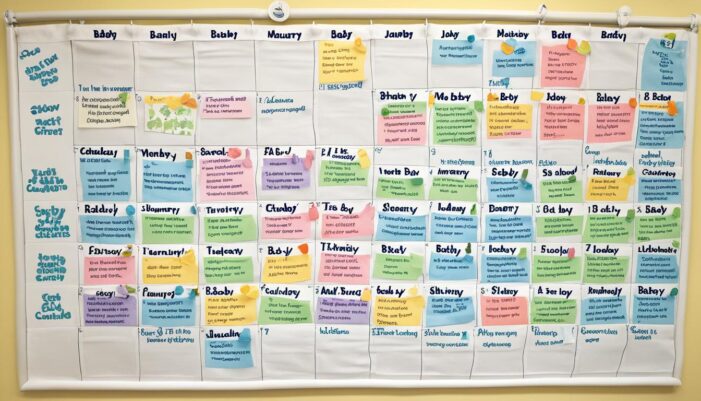Wondering when to start buying baby stuff? Good for you for thinking ahead! Between now and the time you meet your little one, there’s a lot to do…and a lot to buy. The truth is, there is no hard and fast rule on when to start buying things for your baby. Some parents can’t wait to pick out cute baby clothes and nursery décor, while others prefer to hold off for various reasons. In this guide, we’ll discuss a few of those reasons and provide a helpful timeline for buying must-have essentials for your baby.
Key Takeaways
- There is no universal timeline for when to start buying baby items – it depends on your personal preferences and circumstances.
- It’s generally recommended to start purchasing essential items like a crib, car seat, and stroller during the second trimester.
- The third trimester is a good time to shop for clothing, feeding supplies, and other day-to-day necessities.
- Don’t feel pressured to buy everything at once – you can space out your purchases over several months.
- Consider your budget, available space, and delivery timelines when planning your baby shopping schedule.
Preparing for Baby: Considerations Before Shopping
Welcoming a new baby is an exciting time, but it can also be overwhelming when it comes to preparing and shopping for their arrival. Before you dive head-first into buying baby gear, it’s essential to consider a few key factors that can help you make the most informed decisions and avoid unnecessary expenses.
Budget
It’s no secret that babies come with a hefty price tag. According to a USDA report, a middle-income family can expect to spend nearly $13,000 annually per child. The good news is that you have nine months to budget for your new bundle of joy and research ways to save on baby essentials. Remember, babies don’t need the latest and greatest products – creating a realistic budget can help you focus on the necessities and find creative ways to cut costs, such as taking advantage of rewards programs or scouring for coupons.
Space
The size of your nursery is another crucial factor to consider before shopping for baby items. Bulky furniture like large dressers and bookshelves may look appealing, but they may not fit in a smaller space. When building your baby registry or making purchases, keep space constraints in mind and opt for compact, space-saving solutions that will help you create a functional and organized nursery.
Baby Shower
If you’re expecting a baby shower, it’s wise to hold off on buying too many items until after the event. Depending on the generosity of your guests, you may end up receiving a significant portion of your baby’s needs, from clothing and toys to furniture and gear. Even if a shower isn’t in the works, you may still receive hand-me-downs from friends and family, so it’s worth waiting to see what comes your way before making major purchases.
Gender of the Baby
Many parents-to-be prefer to wait until they know the gender of their baby before starting their shopping. This typically happens between 18 and 21 weeks of pregnancy, though some find out as early as 12 weeks. However, you don’t need to know the gender to begin stocking up on essential items. Unisex baby clothes and nursery decor can be a great option if you want to start preparing early.
Package Delivery Times
When shopping online for your baby, don’t forget to factor in the time it takes for items to be delivered. Depending on the retailer and the time of year (holidays can significantly slow down shipping), it could take weeks or even months for your packages to arrive. Keep this in mind, especially if you’re ordering critical items like a car seat or crib.
By considering these key factors before diving into baby shopping, you can make more informed decisions, save money, and ensure your nursery is ready in time for your little one’s arrival.
A Timeline for Buying Baby Essentials
As you prepare for your little one’s arrival, it’s crucial to plan your baby shopping timeline strategically. Between budgeting for a baby and organizing your home to make room for all the necessities, there’s plenty to do before you start shopping. By laying the groundwork now, you’ll set yourself up for a stress-free shopping experience later on.
First Trimester
During the first trimester, focus on laying the foundation for your baby’s arrival. Create a detailed budget, set up a baby registry, research essential baby gear, and start stocking up on consumables like laundry detergent and toilet paper. Even if you’re waiting until after your baby shower to purchase most items, this is a great time to invest in big-ticket items, such as a nursery glider, a stroller, and the baby’s crib.
Second Trimester
As you enter the second trimester, it’s time to start making decisions about your nursery. Choose a theme, order nursery furniture, and set up the baby’s crib. Additionally, this is a good time to decide on the type of diapers you’ll use, whether cloth or disposable, and start researching the options.
Third Trimester
In the third trimester, it’s time to double-check your baby list and purchase all the remaining products you’ll need for your new addition. Stock up on must-have essentials like baby bibs, burp cloths, diaper cream, wipes, and other baby care items. Buy a car seat, round out the baby’s wardrobe, pre-wash baby clothes, and keep an eye out for good deals on the remaining items you need.
By following this timeline, you’ll be well on your way to ensuring a smooth and stress-free preparation for your baby’s arrival. Remember, the key is to stay organized and take things one step at a time, so you can focus on enjoying this exciting journey.
why is my baby waking up every hour
As parents, we’ve all been there – the seemingly endless cycle of our little ones waking up every hour during the night. While it can be exhausting, it’s important to understand that this is a common challenge many families face. The reasons behind these frequent nighttime wakings can vary, but with the right strategies, you can help your baby sleep more soundly and get the rest you both need.
One of the primary reasons babies wake up so often is due to their natural sleep patterns and developmental changes. Newborns, in particular, have a very short sleep cycle, typically lasting only 45 minutes to an hour. As they grow, their sleep cycles become longer, but they may still wake frequently, especially during certain developmental stages.
Another factor that can contribute to hourly wakings is hunger. Babies have small stomachs and need to be fed regularly, even during the night. If your baby is waking up hungry, try to adjust their feeding schedule or offer a small, soothing snack to help them stay asleep longer.
- Discomfort, such as a dirty diaper, gas, or teething pain, can also be a common reason for frequent nighttime wakings.
- The need for soothing, whether it’s a pacifier, rocking, or being held, can also prompt your baby to wake up more often.
To help your baby sleep through the night, you can try the following tips:
- Establish a consistent bedtime routine to signal to your baby that it’s time to sleep.
- Ensure your baby’s sleep environment is comfortable, dark, and quiet to promote better sleep quality.
- Experiment with different soothing techniques, such as white noise, gentle rocking, or soft lullabies, to help your baby self-soothe and stay asleep longer.
- If your baby is waking due to hunger, consider adjusting their feeding schedule or offering a small, nutritious snack before bed.
Remember, every baby is unique, and what works for one may not work for another. If you’re struggling with persistent hourly wakings, don’t hesitate to consult with your pediatrician or a sleep specialist. They can provide personalized advice and help you navigate this challenging phase of parenthood.

| Reason for Hourly Waking | Tips for Better Sleep |
|---|---|
| Developmental changes | Establish a consistent bedtime routine |
| Hunger | Adjust feeding schedule or offer a small snack before bed |
| Discomfort (e.g., dirty diaper, gas, teething) | Ensure a comfortable sleep environment |
| Need for soothing | Experiment with different soothing techniques |
“Sleep is the golden chain that ties health and our bodies together.” – Thomas Dekker
Conclusion
As you embark on your journey to prepare for your new bundle of joy, this comprehensive timeline can serve as a valuable guide. By following this baby shopping timeline, you can ensure that you have all the essential items ready before your little one arrives. From the early stages of budgeting and space planning to the excitement of selecting nursery decor and finalizing your registry, this step-by-step approach can help alleviate the stress and uncertainty that often accompanies the pre-baby period.
Remember, this timeline is merely a suggestion, and the most important factor is to purchase and prepare for your baby in a way that feels right for you and your family. Trust your instincts, listen to the advice of experienced parents, and enjoy the process of getting ready to welcome your new addition. With a little planning and a lot of love, you’ll be well on your way to creating a nurturing environment for your baby shopping timeline summary, when to start preparing for a baby, and getting ready for a newborn.
Happy shopping, and best wishes as you embark on this exciting new chapter!
FAQ
When should I start buying baby stuff?
There is no one-size-fits-all answer, as the timeline for buying baby items can vary. Some parents start shopping early, while others prefer to wait. A helpful approach is to lay the groundwork by creating a budget, setting up a baby registry, and researching essential gear before making purchases.
What factors should I consider when shopping for a baby?
Key considerations include your budget, the amount of space in your home, whether you’re expecting a baby shower, and the gender of your baby. It’s also important to account for package delivery times, especially during busy shopping seasons.
When should I buy big-ticket items for the baby?
Even if you’re waiting until after your baby shower to buy most items, this is a great time to purchase big-ticket necessities like a nursery glider, stroller, and crib. Choose a nursery theme and start ordering furniture early.
What should I buy in the last trimester?
In the third trimester, focus on stocking up on must-have essentials like baby bibs, burp cloths, diaper cream, wipes, and other baby care items. Also, round out the baby’s wardrobe and pre-wash all the new clothes.
Why does my baby wake up every hour?
Babies can have unique sleep patterns and needs, leading to frequent waking. Common reasons include developmental changes, hunger, discomfort, or the need for soothing. Establishing a consistent bedtime routine and providing appropriate sleep environments can help improve a baby’s sleep quality and duration.

